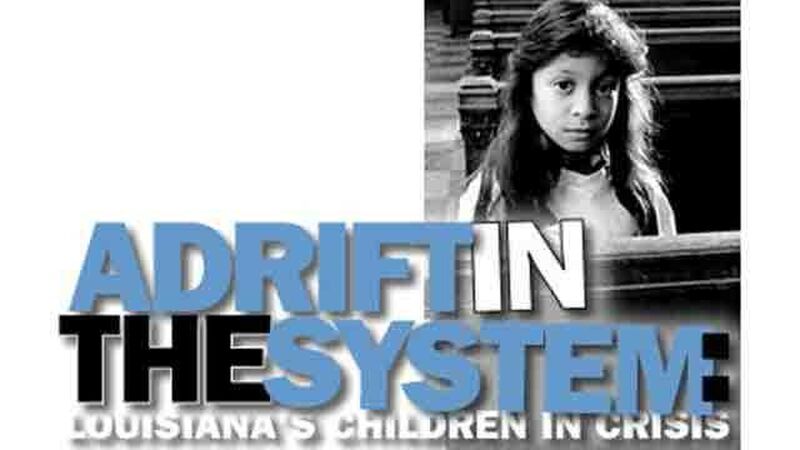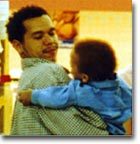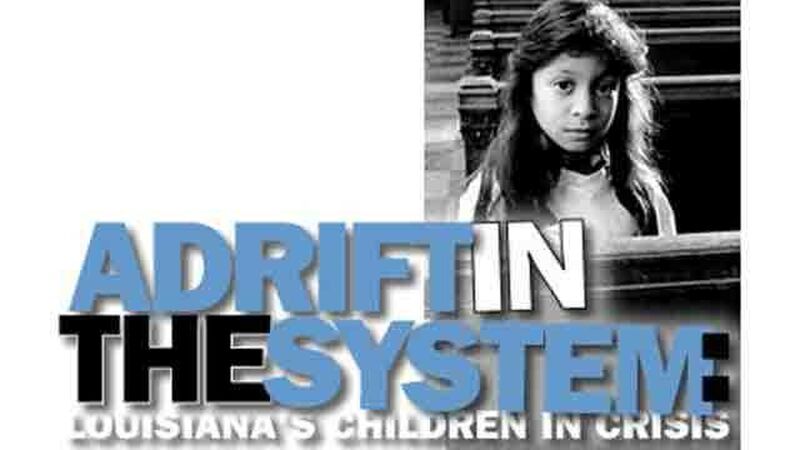
Adrift in the System: Louisiana's Children in Crisis
No one is happy with the present situation. Not case workers. Not frustrated adults trying to adopt. Not attorneys handling another hearing. Not judges with a backlog of cases, but especially, not the child who isn’t sure where he will be sleeping next month. Adrift in the System: Louisiana’s Children in Crisis is a 30-minute documentary that explores the complex issues surrounding foster care in our state.
Good intentions, family preservation programs and past governmental incentives have not solved all the problems. Nearly six thousand of Louisiana’s children are in the foster care system at any given time.
Adrift in the System provides a look at some of the problems and proposed solutions by telling the stories of two Louisiana children who came in contact with the foster care system. Jamie’s case is all too common: a lifetime of multiple placements until he “aged out” of the system. Abby’s story tells what can happen when the system works to the child’s—and society’s—benefit.
The fix isn’t easy. In this program, we’ll hear stakeholders voicing their opinions on proposals for change. We’ll look at how these proposals can be implemented. Leaders are calling for a shift in focus from “family preservation at all costs“ to a child-centered system. Such a system aims to expedite the permanent placement of every child into a safe, loving home.
Adrift in the System provides a forum for parents, children’s advocates, child welfare professionals, legal experts and others to share their ideas on how to make the system more responsive to the needs of Louisiana’s foster children.
About Foster Care

Like the children they serve, foster parents come from a variety of backgrounds. They can be single, married or divorced. They can choose to stay at home with the children, or retain outside employment. They can be as young as 21, or they can be retired seniors. People who are interested in becoming foster parents must first demonstrate the qualities and attributes essential to fostering, including attentiveness, tenacity, patience, and empathy, along with a willingness to grow and learn from the experience of fostering and an equal capacity to love and let go. Then, if they can offer a safe living environment, adequate bedroom space to accommodate a child, and sufficient income to make ends meet even without the reimbursement received through a foster care agency, they can learn, through training programs, the other skills essential for effective fostering.
Foster parents are reimbursed by the state for at least part of the cost of caring for the child. In addition, health costs for children in care are covered by Medicaid, the federal health insurance program for individuals who are poor or disabled, although Medicaid often does not cover mental health services. While children are being cared for by foster parents, their birth parents have an opportunity to obtain treatment and services for the problems they are experiencing, and to work with the foster care agency and foster parents toward the appropriate permanent plan for each child.
Approximately 125,000 non-relative families nationwide are licensed to provide foster care, and the average foster parent is licensed to care for three children. A variety of complex social and economic factors have contributed in recent years to a steady increase in the number of children requiring out-of-home care. Between 1984 and 1993, the number of children in need of out-of-home care increased by 61 percent, while the number of non-relative foster parents available to care for children steadily declined. The result has been a shortage of foster parents, particularly foster parents of color and those who are willing and able to care for sibling groups, medically fragile infants and emotionally disturbed teens. Thus, recruitment and retention of foster parents currently rank among the most pressing needs in the child welfare system.
Louisiana Foster Care Facts

- There are presently 5700 Louisiana children living apart from their families in some form of foster care.
- Of this number, 560 will not return to their birth parents (meaning all legal rights have been terminated), and are available for adoption.
- During 1997-98, 268 Louisiana children were placed from foster care into adoption.
Frequently Asked Questions about Foster Care in Louisiana
What is the service?
Foster Care is a protective service provided to children in the custody of the Department of Social Services. It provides substitute, temporary care (e.g., foster family home, residential care facility, etc.) for a planned period of time when a child must be separated from his own parents or relatives.
Who can receive the service?
Children in the custody of the Department of Social Services who are unable to live with their parents because of parental neglect or abuse.
How long can the service be received?
Only until such time when the child can be reunited with his/her parents or is provided with another type of permanent living situation.
How does one access the service?
One can access the service by contacting the local parish office of the Department of Social Services, Office of Community Services.
Information provided by Louisiana Department of Social Services, Office of Community Services
Adoption 2000

The Louisiana State Department of Social Services, Office of Community Services is preparing to achieve the Adoption 2002 goal of moving foster children more quickly into permanent homes by doubling the number of adoptions over the next five years. This goal has been set forth in the Adoption and Safe Families Act of 1997, passed by Congress. The intent of this Act is to give every child in foster care a safe and permanent home.
Many children drift in and out of the foster care system while waiting for their parents to become prepared for the responsibility of child-rearing. In Louisiana, the average length of time a child stays in foster care is three years. Many of those children are difficult to place into permanent homes since they are considered special-needs children due to their age and emotional problems.
The Office of Community Services submitted its Adoption 2002 Plan to the federal government in May, 1998. This plan calls for an increase in the number of adoptions from 30 per year in 1997, to 616 per year in 2002, while assuring the safety and well-being of children in foster care. Louisiana’s plan will give a financial subsidy and medical assistance to families adopting foster children.
Louisiana’s plan will be implemented in stages that will require the collaboration of OCS employees, the judicial and legal systems and families. State laws are now being reviewed for compliance with the Adoption and Safe Families Act. Technical assistance has been required from the federal government for training to improve staff skills in planning for adoption. Public and private partnerships are also being created to promote adoption for foster children.
People interested in adopting a child should contact their regional Department of Social Services, Office of Community Services to apply for adoptive home certification and to browse information and photos of children listed in the Louisiana Adoption Exchange
Adoption & Safe Families Act of 1997
Major provisions of the Act include:
- Clarifies the definition of ”reasonable efforts” that are required to be given to keep families together. Now, when instances of specific abuse or neglect have occurred, the child’s health and safety will be considered most important when considering family reunification. Previously, the goal of family reunification was considered most important when state agencies worked with parents of children placed into foster care.
- Now, a permanency plan hearing for children in foster care must be held within 12 months of a child entering foster care rather than within 18 months. This hearing must include the permanent placement goal for the child. Termination of parental rights hearings must be initiated for children who have been in foster care for 15 out of 22 months with few exceptions allowed.
- The federally funded Family Preservation and Support Services Program will be expanded to provide additional support to families in need.
- States will be given incentive bonuses of $4,000 for each child who is adopted, plus an additional $2,000 for special needs children.
- States must develop a plan to use resources in other governmental jurisdictions to assist with timely adoptions.
- States must provide health insurance for all special needs children who are adopted with subsides.
How You Can Help

Thank you for your interest in helping children and families in your community. There are many ways in which you can help make a difference.
- Consider adopting a child in the foster care system. Currently in Louisiana, there are 485 children available for adoption.
- Consider becoming a foster parent. Foster parents can be single, married or divorced; homeowners or apartment dwellers. They can have a job outside the home. They can be as young as 21, or they can be retired.
- Join the effort to prevent child abuse and neglect in Louisiana. Prevent Child Abuse Louisiana is a statewide organization dedicated to this purpose. For information on how you can help abused or neglected children call the Wendy’s KidsLine at 1-888-833-KIDS.
- Support teens transitioning into adulthood. Few adolescents in our society are able to support themselves immediately upon graduating from high school. Yet each year in Louisiana, approximately 150 adolescents reach the age (usually 18) at which they must leave foster care and live independently.
- Support children and youth in foster care. Children and youth are entering foster care today with far more complicated needs, often without adequate external support. Some ways you can help include tutoring a child, donating sporting goods, bicycles, computers or educational materials.
- Support Foster Parents. Taking care of children is a 24-hour-a-day job for any parent. In return for their services, licensed foster care parents do receive a modest reimbursement, but it frequently falls short of the actual cost of caring for children. As a result, too often, even the most caring foster parents may eventually become overwhelmed by the financial and emotional burden and are forced to stop fostering.
- Become a Court Appointed Special Advocate (CASA) for children in the system. CASA is an organization that provides volunteer advocates to speak for the best interests of foster children in the court system. You don't have to be a lawyer. For more information call 888-567-CASA.
If you like this program, get the DVD!
Watch this Program
Already a Friend of LPB? - View on Passport.
Not a Friend of LPB? - Join here.
Search on Passport for more great programs!


